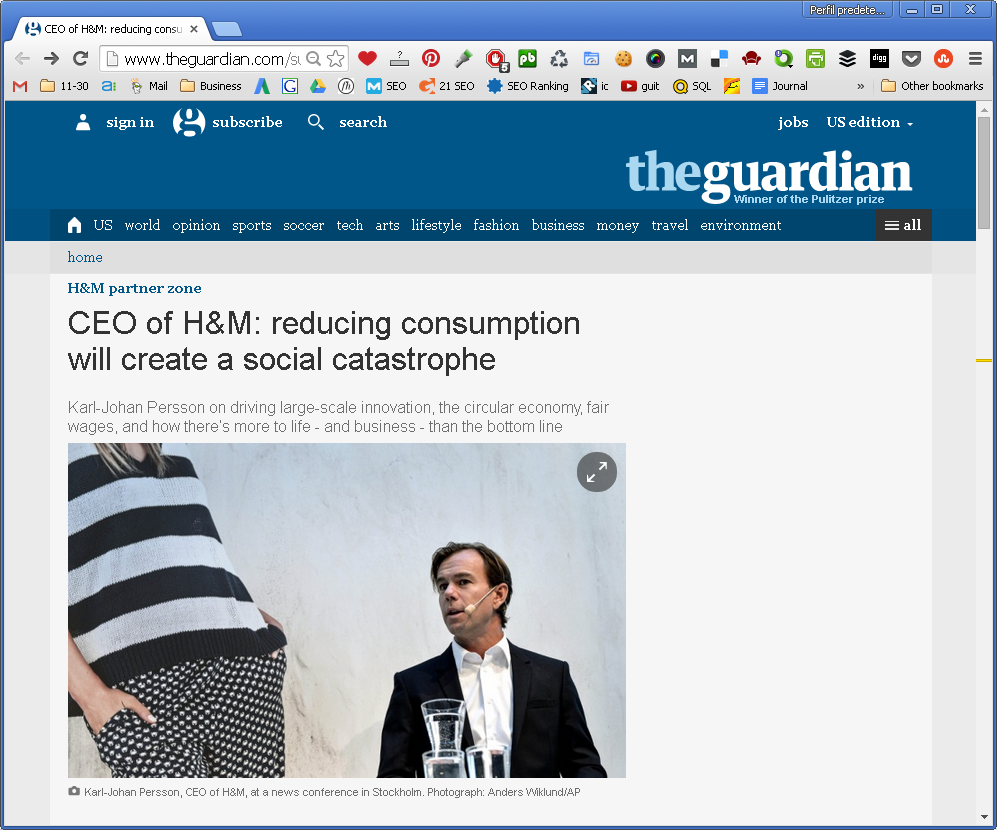Why is everyone in the ethical fashion community so mad at H&M’s CEO? The controversy was spun by this article published on The Guardian where Karl-Johan Persson noted that
“…if we were to decrease 10% to 20% of everything we don’t need, the result on the social and economic side would be catastrophic, including a lot of lost jobs and poverty. So the challenge is doing it in a way where you still can have economic growth and jobs creation, while finding the innovations that can limit the damage to the environment.”
The first sentence of this quote has been subject of outrage and criticism from sustainable fashion defenders such as TreeHugger and Fashion Revolution for painting, in their view, an unrealistic depiction of what the consequences of buying less would be like. I attribute part of the blame to the term “everything we don’t need”, as he could have chosen better words to make his point, but is he right? Conflicts of interest aside, it is true that a dramatic shift in aggregate demand can have negative short term consequences, but a 10% shift is not going to happen overnight, rather, consumption patterns adjust gradually as people get more information and change their preferences, and unemployment is a typical effect of such changes.
So, if all mankind decided to spend 10% less tomorrow it would generate a crisis, resulting in unemployment and lower GDP, there is truth to his comments in a very classical economic theory kind of way. Is he the devil for suggesting that? No. Does he have a gigantic interest in spreading this view of the world? Yes. And that’s why you shouldn’t take his comment too seriously, not because he’s using basic economics to make his point.
Some of the angry comments also mentions a “capitalistic” view of the world, well, where do you think you live? Capitalism is the system in which we live in and it has helped our society achieve great things. Has it also brought pollution and inequality? Yes, but capitalism is all we have and we need to work with it. Nobody is going to take you seriously if you criticize capitalism. Just a thought.
Critics are also right in pointing out how simplistic the CEO’s comments were and they hit the core of the matter when they say that today’s corporations cannot abide by profits only, social justice and environmental considerations are a must, specially for big multinational companies such as H&M.
Due to an inappropriate word selection, a sponsored post that was supposed to highlight all the efforts the company is making to address human rights and environment issues turned some people against them. The truth is that H&M is spending a lot of money in sustainability initiatives and whether they are doing it for consumer pressure or good heart, their efforts have a sizable impact.
I have been critical of the brand as I believe a fast fashion retailer cannot be considered sustainable, as their business model, unsustainable in nature, remains the same and part of their goal is attract a new type of consumer, the so-called “conscious”.
Was Mr. Persson pulling data out of his behind and using it for his PR agenda? Of course. That’s what CEOs do. Was he right? In a very Econ 101 way, yes. Is the company at the forefront of sustainability innovations in the apparel industry? Yes. Are they doing it just to “look good”? Who cares?! Are there better brands out there that are trying much harder to be truly sustainable? Absolutely. And this is another source of public anger: there are small labels that, from the beginning, try to use the most eco-friendly materials and sourcing in the most transparent way possible, for whom earning their title of “sustainable” is not easy. And here comes a giant multinational claiming to be sustainable when they are clearly a fast fashion company. I would get angry too if someone like that made deceptive comments in a major publication targeted to my core consumer.
Conclusion
In summary, it is really important to understand the agenda of each media outlet and writer. H&M has enough money to make everyone think what they want but it is your job as a smart consumer to read between the lines and make an informed decision. Read their reports and make a choice. And beware of sponsored posts.

